|
|
The Programa Eco Cidadão and the Cultivators of Peace
un article par Marielza Cunha Horta, Program Coordinator of Eco Cidadão
Since the year of 2007, when the project was implemented, "Cultivate plants cultivate peace," through the Program Eco Cidadão, in the city of Macaé – Rio De Janeiro – Brazil, we have faced the challenge to transform the principles and values of the culture of peace and environmental education into the reality of daily life.

click on photo to enlarge
During year 2011, through many activities, for children, young, adults with mental suffering, men and women small farmers in conditions of extreme vulnerability and residents in critical and socially violent areas we have carried out workshops to train gardeners of vegetable and agro-ecological gardens, to promote healthy diet, environmental education, education for peace and human rights. This has included debates, courses, lectures, discussion circles, days (Salad Day, International Day of Peace, Day of the Environment, others), campaigns against human trafficking, sexual exploitation, slave working conditions, etc., fairs for solidarity exchange, meeting for interchanges of experiences, expositions of photographs and other creative arts, and technical visits. In this way, we make possible the public diffusion and learning of new concepts and understandings, and we stimulate dialogue, reflection, tolerance, solidarity and practices of cooperation between the involved groups.
We believe that people themselves must be the object and the way to accomplish the process of the construction of a peace culture. We value their individual and collective experiences, recognizing their diverse attitudes and situations as social actors in the most varied areas and spaces.
We revere Dr. Adrelírio Rios Gonçalves, (1934-2000) the Brazilian doctor who achieved universal appreciation for his respect for the human being, for his ethics and for his sensitivity. The discussion on culture of peace in health is recent, but Dr Adrelírio Rios practised it already since the decade of the 1950's, valuing the doctor-patient relationship in which the patients were the protagonists.
Educator, notable researcher, untiring and extremely competent, Dr. Adrelírio was dedicated to science and to the health of the Brazilian people. He believed and he defended progressive and humanist proposals for the improvement of medical service to patients and for the full involvement of medicine in all public and private institutions. He left valuable contributions through his research, assistance and teaching, and more than a thousand scientific publications. He was a example for others in human and professional dignity and he cultivated the culture of peace throughout his life.
He trained many doctors, among them, his disciple Reinaldo Antonio Nunes, who with the master, a “genius and saint”, lived with him, learned from him and shared his mission, giving continuity to his legacy and thus, honoring his history.
Dr Reinaldo Nunes is a cultivator of peace and like Dr. Adrelirio, renews each day a commitment to the promotion of health, opposing passivity and indifference, respecting human values and rights, equality and social justice.
We know that the culture of peace demands deep cultural transformations in society, that it is a continuous process, has beginning, but does not have an end, and in this context, we reaffirm our commitment permanently to advance with the determination and courage necessary to fulfill this mission.
(Click here for a Portuguese version of this article)
|








|
DISCUSSION
Question(s) liée(s) à cet article:
When you cultivate plants, do you cultivate peace?,
* * * * *
Commentaire le plus récent:
CPNN has just received the following message (see a rough English translation below):
CPNN vient de recevoir le message suivant:
Merci pour ces informations
D'ailleurs par rapport au climat , aujourd hui 11 Décembre est notre journée locale de l'arbre (pour le climat et la culture).
Nous avons planté des arbres fruitiers pour faire revivre nos traditions (notre culture) qui voulaient que la retraite des paysans s'assurait par les arbres fruitiers. Aussi la plante de MURINGA pour symboliser les plantes médicinales et fin une espéce sauvage d'arbre dont les feuilles sont mangées par les chenilles (comestibles à l homme).
C'est 2 ans que nous organisons cette journée et nous faisons des émissions à la radio et TV pour la vulgarisation de cette culture de la paix (manger, planter pour le générations futures et le climat du monde entier)
Solidarité
victor nzuzi
rd congo
********************
CPNN has just received the following message which is translated here (see above for the original French version).
Thank you for the information.
With regards to climate change, today December 11 is our local "day of the tree" (for our climate and our culture). We have planted fruit trees to revive our traditions (our culture), to assure with fruit trees the retirement of our local farmers . Also the planting of MURINGA to symbolize medicinal plants, a wild species of tree whose leaves are food for caterpillars that we can eat.
It's been two years now that we organize this day and we broadcast radio and TV programs to popularize this culture of peace (eat and plant for future generations and for the climate of the whole world).
In solidarity,
Victor Nzuzi
Democratic Republic of the Congo

|
|









